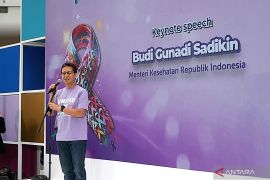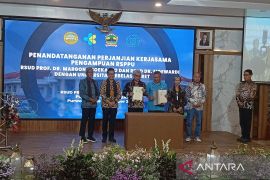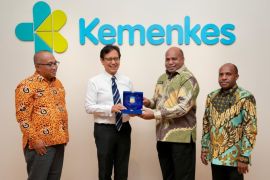Currently, one in one thousand Indonesians can potentially suffer from a heart attack. Only 25 percent, or 25 thousand of them, can be served by health workers. Others can potentially dieJakarta (ANTARA) - Health Minister Budi Gunadi Sadikin highlighted that the government had made three efforts to fulfill the need for even distribution of specialist doctors to tackle catastrophic diseases.
"Currently, one in one thousand Indonesians can potentially suffer from a heart attack. Only 25 percent, or 25 thousand of them, can be served by health workers. Others can potentially die," Sadikin noted here on Monday.
According to the minister, heart health services, as one of the catastrophic diseases, is a government priority that requires service transformation to accommodate the needs of the Indonesian people evenly.
Sadikin noted that his ministry attempted to increase the availability of specialist doctors, which are currently very few in number as compared to general practitioners.
Related news: Prompt herd immunity formation protects Indonesia from XBB: Minister
To overcome this, the Health Ministry is increasing the number of study programs since out of 92 medical faculties in Indonesia, only 20 have cardiac study programs, Sadikin added.
Meanwhile, only two study programs are specifically involved in thoracic, cardiac, and vascular surgery, he pointed out.
To this end, the Health Ministry is collaborating with the Education and Culture Ministry to pursue the fulfillment of need for health workers by increasing the number of medical study programs to produce more specialist doctors.
“We have (made) calculations that from 188 specialists, only 42 work. This figure is certainly not sufficient to serve the 270 million people of Indonesia," he remarked.
Another effort made by the government was to open a scholarship network with professional organizations.
Related news: Indonesia receives five million doses of COVID-19 vaccine: Minister
“Currently, there is still a shortage of health workers, and it will take decades to fulfill it. To expedite the fulfillment, we will open a scholarship program. All hospitals must provide scholarships from the help of professional organizations. I hope it can be opened soon," Sadikin said.
To support this program, the Ministry of Health has committed to increasing the quota of scholarships for doctors and specialists at home and abroad.
Earlier, only 200 to 300 scholarships were available, while in 2022, the number will be increased to 1,500 per year.
Sadikin highlighted that ministry also encouraged hospital-based doctor education by adding a specialist medical education system that was originally university-based, with the presence of a supporting hospital for knowledge transfer.
“University-based system will still exist, but the hospital-based one will be added. We encourage both of them to accelerate an increase in (the number of) specialist doctors," he concluded.
Related news: 2nd G20 HMM outlines 6 actions to improve global health architecture
Related news: Acute kidney injury: BPOM asked to quality test drugs
Translator: Andi Firdaus, Resinta S
Editor: Fardah Assegaf
Copyright © ANTARA 2022












